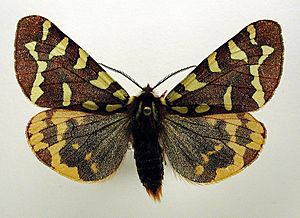Pararctia lapponica facts for kids
Quick facts for kids Pararctia lapponica |
|
|---|---|
 |
|
| Scientific classification |
|
| Kingdom: | Animalia |
| Phylum: | Arthropoda |
| Class: | Insecta |
| Order: | Lepidoptera |
| Superfamily: | Noctuoidea |
| Family: | Erebidae |
| Subfamily: | Arctiinae |
| Genus: | Pararctia |
| Species: |
P. lapponica
|
| Binomial name | |
| Pararctia lapponica (Thunberg, 1791)
|
|
| Script error: The function "autoWithCaption" does not exist. | |
| Synonyms | |
|
|
Script error: No such module "Check for conflicting parameters".
The Pararctia lapponica is a type of moth from the Erebidae family. It was first described by a scientist named Carl Peter Thunberg in 1791. This moth lives in the cold, northern parts of Eurasia and the Arctic areas of North America.
What it Looks Like
This moth is not very big. Its wingspan (the distance from one wingtip to the other when the wings are spread out) is usually between 37 and 45 millimeters. That's about the length of two small paperclips!
Where it Lives
You can find the Pararctia lapponica moth in very cold places. It lives in the northern parts of Europe and Asia, which is called Eurasia. It also lives in the Arctic regions of North America, like parts of Canada and Alaska. These areas are known for their cold weather and unique plants.
What it Eats
The Pararctia lapponica moth starts its life as a larva, which is like a caterpillar. These larvae love to eat certain plants found in their cold habitats. They munch on plants like Betula nana, Vaccinium uliginosum (a type of blueberry), and Rubus chamaemorus.
Subspecies
Sometimes, animals of the same species can have slight differences depending on where they live. These different groups are called subspecies. The Pararctia lapponica moth has a few known subspecies:
- Pararctia lapponica lapponica: This one lives in the polar parts of Eurasia.
- Pararctia lapponica lemniscata: This subspecies was identified in 1911 and lives in the mountains of eastern Yakutia (a region in Russia).
- Pararctia lapponica hyperborea: This one was identified in 1835.
- Pararctia lapponica gibsoni: This subspecies was identified in 1927.

